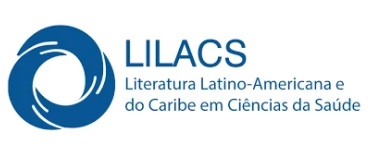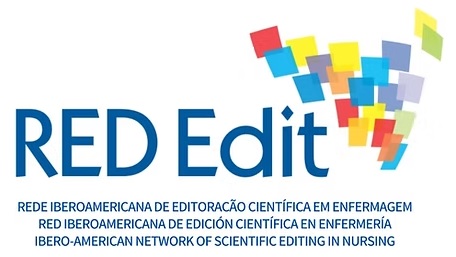Saúde física e mental de enfermeiros de uma UTI Pediátrica afastados por infecção pela COVID-19
DOI:
https://doi.org/10.33159/25959484.repen.2023v34a06Palavras-chave:
enfermeiros, COVID-19, avaliação do impacto na saúde, saúde mental, Unidades de Terapia Intensiva PediátricaResumo
Objetivo: Compreender a experiência dos enfermeiros atuantes em duas Unidades de Terapia Intensiva Pediátrica de um complexo hospitalar Paulista, afastados do trabalho por suspeita de infecção pela COVID-19. Método: estudo prospectivo de abordagem qualitativa utilizou método do Estudo de Caso para compreender a experiência dos enfermeiros que foram afastados do trabalho por suspeita de infecção pela COVID-19. Aplicou-se questionário para coleta de dados demográficos e perguntas voltadas ao período do afastamento até retorno das atividades. Resultados: Onze enfermeiros foram afastados do trabalho, 90,9% era do sexo feminino e testou positivo para COVID-19, 81,8% sentiu maior impacto emocional no período. Ganho de peso, ansiedade, apreensão e medicação para dormir foram mudanças mais referidas. A Análise de Conteúdo evidenciou as Categorias Dificuldades do afastamento,
Sentimentos pós-diagnóstico, Consequências da infecção por COVID-19, Importância do apoio institucional. Considerações Finais: o impacto físico e mental causado pela COVID-19 nos enfermeiros refletem diretamente no retorno ao trabalho, devem receber a mesma atenção das instituições devido às complicações e sequelas que esta infecção pode causar e corroboram a necessidade das instituições de saúde oferecerem cuidados de saúde física e mental aos profissionais.
Referências
1. Thompson DR, Lopez V, Lee D, Twinn S. SARS: a perspective from a school of nursing in Hong Kong. J Clin Nurs. 2004;13:131–5. https://doi.org/10.1046/j.1365-2702.2003.00884.x
2. Bai YM, Lin CC, Lin CY, Chen JY, Chue CM, Chou P. Survey of Stress Reactions Among Health Care Workers Involved With the SARS Outbreak. Psychiatr Serv. 2004;55(9):1055-7. https://doi.org/10.1176/appi.ps.55.9.1055
3. Wu P, Fang Y, Guan Z, Fan B, Kong J, Yao Z, et al. The psychological impact of the SARS epidemic on hospital employees in China: exposure, risk perception, and altruistic acceptance of risk. Can J Psychiatr. 2009;54(5):302-11. https://doi.org/10.1177/070674370905400504
4. Poon E, Liu KS, Cheong DL, Lee CK, Yam LY, Tang WN. Impact of severe respiratory syndrome on anxiety levels of front-line health care workers. Hong Kong Med J [Internet]. 2004[cited 2022 Jul 19];10(5):325-30. Available from: https://pubmed.ncbi.nlm.nih.gov/15479961/
5. Maunder RG, Lancee WJ, Balderson KE, Bennett JP, Borgundvaag B, Evans S, et al. Long-term psychological and occupational effects of providing hospital healthcare during SARS outbreak. Emerg Infect Dis. 2006;12(12):1924. https://doi.org/10.3201/eid1212.060584
6. Nickell LA, Crighton EJ, Tracy CS, Al-Enazy H, Bolaji Y, Hanjrah S, et al. Psychosocial effects of SARS on hospital staff: survey of a large tertiary care institution. Cmaj. 2004;170(5):793-8. https://doi.org/10.1503/cmaj.1031077
7. Maben J, Bridges J. Covid-19: Supporting nurses’ psychological and mental health. J Clin Nurs. 2020;29:2742-50. https://doi.org/10.1111/jocn.15307
8. Al-Mandhari A, Gedik FG, Mataria A, Oweis A, Hajjeh R. 2020 – the year of the nurse and midwife: a call for action to scale up and strengthen the nursing and midwifery workforce in the Eastern Mediterranean Region. East Mediterr Health J. 2020;26(4):370–1. https://doi.org/10.26719/2020.26.4.370
9. Bardin L. Análise de conteúdo. Lisboa: Edições 70; 1977.
10. Müller MR, Guimarães SS. Impacto dos transtornos do sono sobre o funcionamento diário e a qualidade de vida. Estud Psicol. 2007;24(4):519-528. https://doi.org/10.1590/S0103-166X2007000400011
11. Talevi D, Socci V, Carai M, Carnaghi G, Faleri S, Trebbi E, et al. Mental health outcomes of the CoViD-19 pandemic. Riv Psichiatr. 2020;55(3):137-144. https://doi.org/10.1708/3382.33569
12. Zhan Y, Liu Y, Liu H, Li M, Shen Y, Gui L, et al. Factors associated with insomnia among Chinese frontline nurses fighting against COVID-19 in Wuhan: a cross-sectional survey. J Nurs Manag. 2020;28(7):1525–35. https://doi.org/10.1111/jonm.13094
13. Liu S, Yang L, Zhang C, Xiang YT, Liu Z, Hu S, Zhang B. Online mental health services in China during the COVID-19 outbreak. Lancet Psychiatr. 2020;7(4):e17-e18. https://doi.org/10.1016/S2215-0366(20)30077-8
14. Office for National Statistics (ONS). Suicide by occupation, England: 2011 to 2015 [Internet]. 2017[cited 2022 Jul 19]. Available from: https://www.ons.gov.uk/releases/suicidesbyoccupationengland2011to2015
15. Sani G, Janiri D, Di Nicola M, Janiri L, Ferretti S, Chieffo D. Mental health during and after the COVID-19 emergency in Italy. Psychiatry Clin Neurosci. 2020;74(6):372-3. https://doi.org/10.1111/pcn.13004
16. Chew NWS, Lee GKH, Tan BYQ, Jing M, Goh Y, Ngia NJH, et al. A multinational, multicentre study on the psychological outcomes and associated physical symptoms amongst healthcare workers during COVID-19 outbreak. Brain, Behav Immunity. 2020;88:559–565. https://doi.org/10.1016/j.bbi.2020.04.049
17. Fukuti P, Uchôa CLM, Mazzoco MF, Corchs F, Kamitsuji CS, Rossi L, et al. How Institutions Can Protect the Mental Health and Psychosocial Well-Being of Their Healthcare Workers in the Current COVID-19 Pandemic. Clinics (Sao Paulo). 2020;75:e1963. https://doi.org/10.6061/clinics/2020/e1963
Downloads
Publicado
Como Citar
Edição
Seção
Licença
Copyright (c) 2023 Revista Paulista de Enfermagem

Este trabalho está licenciado sob uma licença Creative Commons Attribution 4.0 International License.
Propriedade intelectual
Todo o conteúdo da REPEn, exceto onde está identificado, está licenciado sob uma Licença Creative Commons do tipo atribuição CC-BY (https://creativecommons.org/licenses/by/4.0/deed.pt_BR).










